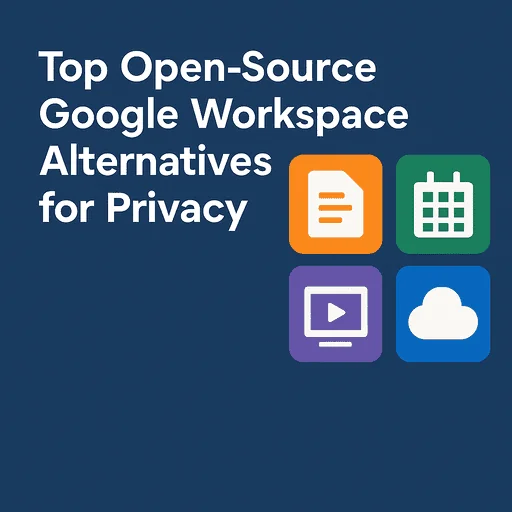Introduction
If you’re looking to replace Google Workspace with a more private, self-hosted, or open-source alternative, you’re not alone. More individuals and teams are turning away from Big Tech services due to privacy concerns, vendor lock-in, or a desire for self-reliance.
This guide breaks down the best alternatives to core Google Workspace components—Docs, Drive, Gmail, Meet, Calendar, and more—with a focus on open-source and self-hostable solutions. Whether you’re a beginner or an advanced user, you’ll find tools that match your values and use case.
1. Why Look Beyond Google Workspace?
- Privacy: Google scans and stores user metadata; alternatives often don’t.
- Ownership: You don’t control your data with Google.
- Customization: Self-hosted tools let you adapt your stack.
- Cost control: Google Workspace has recurring costs; self-hosting can be cheaper long-term.
Beginner tip: You don’t have to switch everything at once—many people begin with just email or file storage.
2. Best All-in-One Suites
🔹 Nextcloud Hub
- Replaces: Drive, Docs, Calendar, Meet, Chat, Forms
- Self-hosted: Yes
- Strengths: Modular, private, hundreds of extensions
- Weaknesses: Setup complexity
Highlights: File syncing, collaborative editing (OnlyOffice/Collabora), chat/video (Nextcloud Talk), calendar (CalDAV), forms, and task management.
Advanced users: Integrate with LDAP, SSO, or external storage (S3, SMB, WebDAV).
🔹 CryptPad
- Replaces: Docs, Sheets, Slides
- Self-hosted: Optional
- Strengths: Zero-knowledge encryption, no login required
- Weaknesses: Fewer integrations, no email/calendar
Use when: You want collaborative editing with full end-to-end encryption. Great for documents, whiteboards, kanban boards.
3. File Storage & Sync Alternatives
🔹 Nextcloud Files
Already covered above, but it’s the most complete replacement for Google Drive.
🔹 Seafile
- Focus: High-performance file sync
- Strengths: Fast syncing, file deduplication
- Weaknesses: Fewer collaborative tools
Tip: Best used as a Dropbox-style Drive alternative with LAN sync.
4. Email & Calendar
🔹 Mailcow / Mailu / Modoboa
- Replaces: Gmail
- Self-hosted: Yes
- Strengths: Full mail server with webmail (e.g. SOGo, Roundcube)
- Weaknesses: Requires DNS knowledge, maintenance
Beginner note: Start with ProtonMail or Tutanota if you’re not ready to host email.
🔹 Radicale / Baikal
- Replaces: Google Calendar/Contacts
- Self-hosted: Yes
- Protocols: CalDAV & CardDAV
These integrate well with Nextcloud or Thunderbird.
5. Video Calls & Chat
🔹 Jitsi Meet
- Replaces: Google Meet
- Self-hosted: Optional
- Strengths: Instant video meetings, no login needed
- Weaknesses: Resource-intensive at scale
🔹 Matrix + Element
- Replaces: Google Chat / Slack
- Self-hosted: Yes
- Strengths: Decentralized, end-to-end encrypted
- Weaknesses: Steeper learning curve
Tip: Use Matrix for persistent chat, Jitsi for meetings, and connect them via bridges.
6. Forms & Surveys
🔹 Nextcloud Forms
- Replaces: Google Forms
- Strengths: Built-in, simple surveys and polls
- Weaknesses: Lacks logic branching
🔹 LimeSurvey / Fider
- Use case: Complex surveys or feature requests
- Self-hosted: Yes
7. Office Document Editing
🔹 Collabora Online / OnlyOffice
- Replaces: Docs, Sheets, Slides
- Self-hosted: Yes
- Strengths: Real-time collaborative editing
- Weaknesses: Setup can be resource-heavy
Best paired with Nextcloud for seamless UX.
8. Best Starter Stack (Minimal Setup)
For newcomers, start with:
- File storage: Nextcloud Files (or Seafile)
- Office suite: OnlyOffice (integrated)
- Email: ProtonMail (hosted) or Mailcow (self-hosted)
- Chat: Matrix + Element
- Calendar/Contacts: Nextcloud or Radicale
Tip: Begin with just one service—like replacing Google Drive—and expand gradually.
9. Conclusion
Switching from Google Workspace to open-source alternatives is more possible than ever. While self-hosting requires setup and maintenance, the rewards are privacy, control, and customization.
Whether you’re a solo user or a privacy-focused team, tools like Nextcloud, Matrix, and OnlyOffice give you powerful, independent alternatives.

